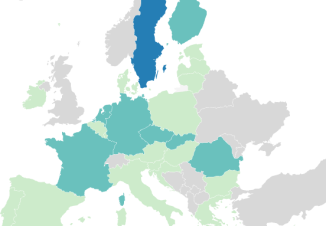
The European Court of Justice case of CCOO v Deutsche Bank in the summer of 2019 made it clear that employers must have objective, reliable and accessible systems for recording and measuring the duration of time worked each day by every worker.
When the judgment came out, we produced some resources and now, 18 months on, we have updated all our material. What follows is accurate as at 25 November 2020.
To help employers understand the differing levels of risk across the EU in relation to time recording, we have drawn up some data on risk. For the map below, we asked our experts across the EU to rate the strictness of their time-recording requirements on a scale of 1 to 3. We then asked them to rate the strength of the enforcement regime and we added the scores together to build a colour-coded picture of risk. Countries with no existing specific time-recording requirements and a soft approach to enforcement pose the lowest risk, whereas countries with strict time-recording requirements and strong enforcement regimes pose the highest risk.
The following table shows which countries fall within the various risk groups.
*Belgium: Recent caselaw in Belgium has referred to the European case law, which in one case led to the employer being required to pay overtime, as they did not have a time registering system and did not cooperate when asked for proof of hours that were worked/not worked by the employee. Another judge ruled however that, for the time being, there is no general obligation in Belgium to register time so the employer has not committed any fault. Legislation will need to be adapted, but we do not expect changes in the next 12 months.
*France: The French government has not made any announcement about this ECJ decision to date and we doubt that this will be considered as a priority in the next months.
*Germany: German legislation has not yet been updated to introduce a time recording requirement in response to the ECJ case law. However, the Emden Labour Court decided on 20 February 2020 that an employer was obliged to pay overtime compensation because it had failed to establish a time recording system. The court considered that the employer’s obligation to establish an objective, reliable and accessible system for the recording of working time resulted from Art. 31 (2) of the EU Charter of Fundamental Rights. However, this is a controversial decision and the prevailing opinion tends to assume that there is no general time recording requirement. At the beginning of 2020, we expected new legislation requiring the recording of working time to be presented, as a draft was supposed to be prepared. This did not happen, but legislative change is still expected.
*Greece: A new draft bill is expected to be submitted in Greece soon, which will introduce a new digital working hour system and the use of electronic work cards. This measure seeks to keep a complete record of working hours and minimize undeclared and uninsured work, as well as types of falsely declared part-time work. Overtime and overworking will also be recorded. The electronic system will record the time of arrival and departure of employees in real time and automatically transmit the data to the Labour Ministry’s ERGANI II system, where it will be cross-checked with data reported by employers. The use of electronic work cards is expected to begin on a pilot basis in large companies and gradually rolled out to the whole private economy by the end of 2021.
*Netherlands: The rules on working time do not apply to employees earning more than three times the national minimum wage (i.e. those earning more than approximately EUR 59,000 per year).
*Poland: In Poland, a small change has been introduced in response to the Covid-19 pandemic. If, during the Covid-19 pandemic, the employer instructs an employee to perform work remotely, then the employer may also instruct the an employee to provide a ‘record of performed tasks’, including details of the employee’s activities, date of their performance and time spent. This may be required by all employees working remotely regardless of the working time system applicable to them. This means that it can be imposed on employees whose working hours normally, according to Polish law, are not recorded.
We asked our lawyers whether the law in their country complies with the judgment. Some said yes and some explained that the law does not quite match up to expectations yet. Hover on the map to see details.


